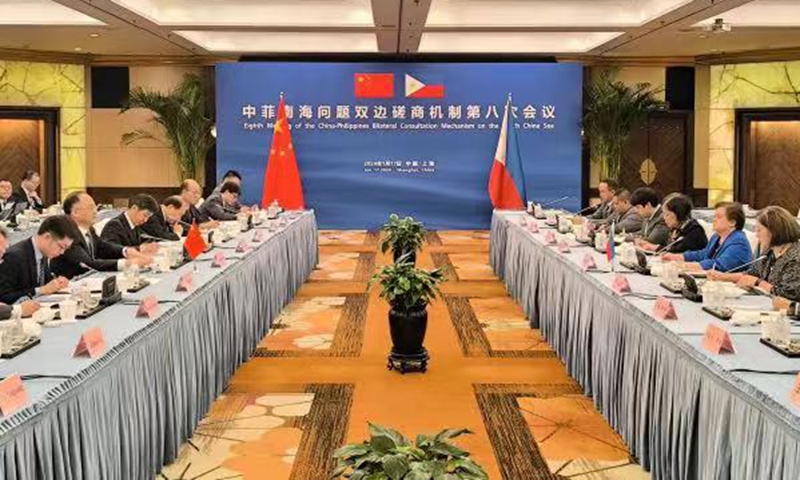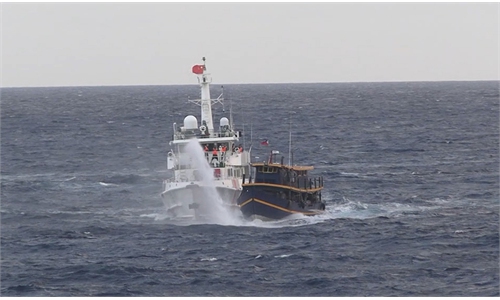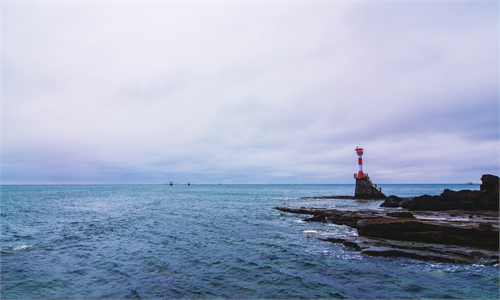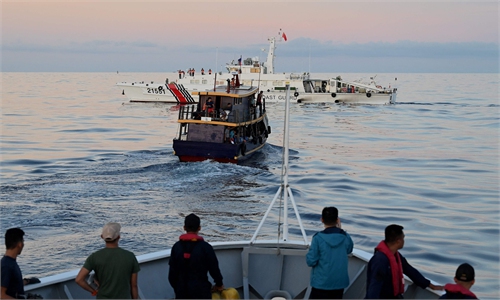China, Philippines hold new round of bilateral consultation meeting, agree on improving sea-related communication

Eighth meeting of the China-Philippines Bilateral Consultation Mechanism on the South China Sea Photo: Website of Chinese Foreign Ministry
China and the Philippines held the eighth meeting of the China-Philippines Bilateral Consultation Mechanism (BCM) on the South China Sea in Shanghai on Wednesday amid rising tensions, and the two sides agreed on improving the sea-related communication mechanism and handling maritime emergencies, especially the situation on the Ren'ai Jiao (also known as Ren'ai Reef).
Some Chinese experts believed that the continuation of this mechanism and the dialogue is significantly important, indicating that China and the Philippines do have channels and mechanisms to address their differences.
It also sends a strong signal to the outside world that China and the Philippines can resolve their bilateral disputes through bilateral channels, without the need for external interference and involvement, they noted.
Assistant Foreign Minister Nong Rong co-chaired the meeting with Philippine Undersecretary Theresa Lazaro. Both sides reiterated that South China Sea disputes do not define the entire bilateral relationship and emphasized the importance of communication and dialogue in maintaining maritime peace and stability.
Both sides agreed to enhance the sea-related communication mechanism, manage maritime conflicts and differences through friendly consultations, address maritime emergencies, particularly the situation on Ren'ai Jiao, and further promote practical maritime cooperation. These efforts aim to create opportunities for the healthy and stable development of China-Philippines relations.
Since last year, maritime tensions, primarily centered around Ren'ai Jiao, have escalated between China and the Philippines. This escalation has had repercussions on both sides' coast guard communication mechanisms, including those related to Ren'ai Jiao," Chen Xiangmiao, director of the World Navy Research Center at the National Institute for South China Sea Studies, told the Global Times on Thursday.
"It has also impacted bilateral relations. The main objective of this communication is comprehensive conflict management and the prevention of misjudgments," Chen said.
Recent actions by the Philippines, including the declaration of its intention to develop South China Sea islands to make them more habitable for troops, imply a desire to exert actual control. This is viewed by China as a violation of the spirit of the Declaration on the Conduct of Parties in the South China Sea, experts said.
However, it has been more than a month since the Philippines last sent ships to intrude into the waters around China's Ren'ai Jiao. This marks the longest period without Manila's provocations since August, 2023.
According to some experts, this situation represents a temporary de-escalation of tensions in the South China Sea, following China's display of determination in safeguarding its sovereign security and maritime rights through legitimate measures.
"The primary reason for the persistent tensions between China and the Philippines lies in certain domestic political forces within the Philippines. They aim to use the South China Sea as a significant bargaining chip in negotiations with China while also leveraging the South China Sea issue as a means to deal with the US," Xu Liping, director of the Center for Southeast Asian Studies at the Chinese Academy of Social Sciences, told the Global Times on Thursday.
This reflects the complex situation in dealing with the Philippines in the context of the South China Sea, Xu said, noting that the key is to continue advancing negotiations within the existing mechanism. "This is essential for reducing domestic noise and returning bilateral discussions to a normal track."
Although the official communication channel between China and the Philippines on the South China Sea has resumed, some Philippines officials have continued making provocative remarks toward China.
Philippines' Defense Secretary Gilberto Teodoro on Wednesday accused a Chinese foreign ministry spokesperson of insulting President Ferdinand Marcos Jr during a news briefing, stooping to what he called "low and gutter-level talk," according to Reuters.
Teodoro was reacting to Chinese Foreign Ministry spokesperson Mao Ning's remarks on Tuesday telling Marcos to "read more books to properly understand the ins and outs of the Taiwan issue" after Marcos congratulated Lai Ching-te on his election victory, referring to him as "president-elect," which was a blatant violation of the one-China principle and the communiqué on the establishment of diplomatic relations between China and the Philippines.
Defense Secretary Gilberto Teodoro Jr. also told that the Philippines is building defense alliances with the US and other security partners to help pave the way for resource exploration in the oil-and-gas-rich South China Sea, Bloomberg News reported on Wednesday.
On maritime disputes, we always uphold peaceful settlement through negotiation and consultation, and managing disputes through making rules and setting up mechanisms. Before disputes are settled, resource exploration and extraction needs to be conducted through joint development, said Chinese Foreign Ministry spokesperson Mao Ning. Mao reaffirmed that the Philippines' development of alliance and military cooperation with relevant countries should not undermine China's lawful rights and interests in the South China Sea.
Since Marcos Jr. took office in 2022, the fluctuations in China-Philippines relations are primarily attributed to domestic political changes and shifts in the political landscape within the Philippines. Particularly, Marcos Jr. himself has had relatively weak control over various political forces in the Philippines, leading to diverse voices within the country, Chen noted.
"Consequently, the relationship between China and the Philippines often faces the uncertain factor of domestic politics in the Philippines. Some individuals exploit these uncertainties to exaggerate tensions between China and the Philippines, resulting in the escalation of conflicts between the two sides," he said.
"In addition to exerting pressure on the Marcos Jr. government, these discordant voices have also provided opportunities for the US and some other foreign countries to use the Philippines as a pawn in their competition with China," Chen added.
During the Wednesday meeting, China strongly conveyed its position to the Philippines regarding Taiwan-related questions. China demanded that the Philippines sincerely adhere to the one-China principle and promptly cease any incorrect statements or actions related to Taiwan.
The Philippines reiterated its commitment to the one-China policy and affirmed its intention to continue implementing it effectively.
Following the consultation and dialogue, in the short term, there may not be an escalation of maritime tensions between China and the Philippines. However, in the future, there remain unpredictable factors, experts said.
"The crucial point is for both China and the Philippines to maintain their bilateral negotiation mechanism and potentially supplement or improve certain aspects of it. This way, both parties can genuinely resolve their differences through peaceful means, including addressing the issue of Ren'ai Jiao," Xu said.
In particular, the Philippines should refrain from deliberately inflating this issue and avoid seeking support from certain external major powers. Such actions are not conducive to resolving the Ren'ai Reef matter, Xu added.





